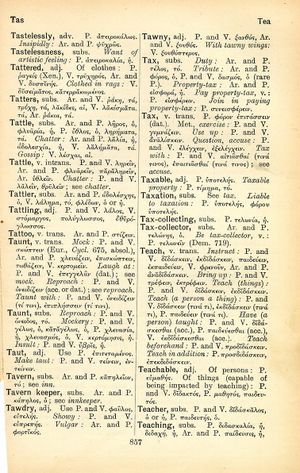tatters: Difference between revisions
From LSJ
Ὥσπερ αὐτοῦ τοῦ ἡλίου μὴ ὄντος καυστικοῦ, ἀλλ' οὔσης ζωτικῆς καὶ ζωοποιοῦ θέρμης ἐν αὐτῷ καὶ ἀπλήκτου, ὁ ἀὴρ παθητικῶς δέχεται τὸ ἀπ' αὐτοῦ ϕῶς καὶ καυστικῶς· οὕτως οὖν ἁρμονίας οὔσης ἐν αὐτοῖς τινὸς καὶ ἑτέρου εἴδους ϕωνῆς ἡμεῖς παθητικῶς ἀκούομεν → Just as although the Sun itself does not cause burning but has a heat in it that is life-giving, life-engendering, and mild, the air receives light from it by being affected and burned, so also although there is a certain harmony and a different kind of voice in them, we hear it by being affected.
(CSV5) |
m (Woodhouse1 replacement) |
||
| Line 1: | Line 1: | ||
{{Woodhouse1 | {{Woodhouse1 | ||
|Text=[[File:woodhouse_857.jpg|thumb|link={{filepath:woodhouse_857.jpg}}]] | |Text=[[File:woodhouse_857.jpg|thumb|link={{filepath:woodhouse_857.jpg}}]] | ||
===substantive=== | |||
Ar. and V. ῥάκη, τά, τρύχη, τά, λακίδες, αἱ, V. λακίσματα | [[Aristophanes|Ar.]] and [[verse|V.]] [[ῥάκη]], τά, [[τρύχη]], τά, [[λακίδες]], αἱ, [[verse|V.]] [[λακίσματα]], τά, [[Aristophanes|Ar.]] [[ῥάκια]], τά. | ||
}} | }} | ||

